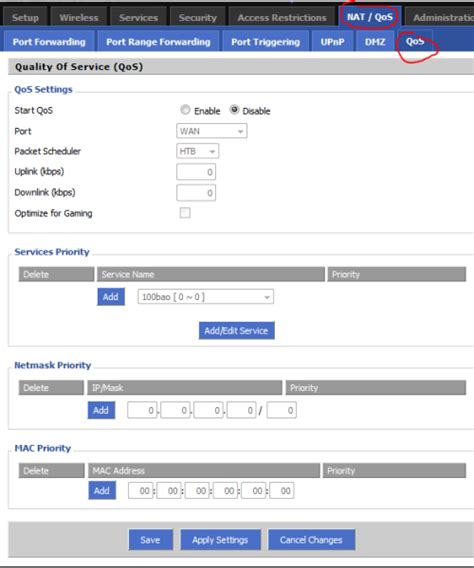What is OpenWrt?
OpenWrt is an open-source firmware based on the Linux kernel, designed for embedded devices such as routers and access points. It provides a fully writable filesystem with package management, allowing users to customize their device through the use of packages to suit their needs. OpenWrt is known for its flexibility, extensibility, and strong community support.
Key Features of OpenWrt
- Customizable firmware with a wide range of packages available
- Supports a variety of hardware platforms
- Robust security features, including firewall and VPN support
- Advanced networking capabilities, such as QoS and VLANs
- Active community development and support
What is DD-WRT?
DD-WRT is another popular open-source firmware for routers, built upon the Linux kernel. It is designed to enhance the functionality and performance of wireless routers, providing users with a wide range of features and customization options. DD-WRT has a user-friendly web interface and supports a large number of router models.
Key Features of DD-WRT
- Easy-to-use web interface for configuration and management
- Supports a wide range of router hardware
- Advanced security features, including VPN and firewall support
- Bandwidth monitoring and control options
- Extensible through the use of third-party scripts and modules
OpenWrt vs DD-WRT: Feature Comparison
To help you better understand the differences between OpenWrt and DD-WRT, let’s compare their features side-by-side:
| Feature | OpenWrt | DD-WRT |
|---|---|---|
| Supported Hardware | Wide range of devices | Large number of router models |
| User Interface | Command-line based, optional web interface | User-friendly web interface |
| Customization | Highly customizable through packages | Customizable through scripts and modules |
| Security Features | Firewall, VPN, and other advanced security options | Firewall, VPN, and other security features |
| Networking Capabilities | Advanced QoS, VLANs, and other networking features | Bandwidth monitoring and control |
| Community Support | Active community development and support | Large user community and support forums |
As you can see, both OpenWrt and DD-WRT offer a wide range of features and benefits. The choice between them largely depends on your specific needs and preferences.

Performance Comparison
When it comes to performance, both OpenWrt and DD-WRT offer significant improvements over stock router firmware. However, there are some differences to consider:
- OpenWrt is known for its lightweight and efficient design, which can result in better performance on resource-constrained devices.
- DD-WRT, while generally performant, may be more resource-intensive due to its user-friendly web interface and additional features.
Ultimately, the performance of either firmware will depend on the specific hardware being used and the configuration options selected.
Ease of Use
One of the main differences between OpenWrt and DD-WRT is their ease of use:
- OpenWrt is primarily configured through the command-line interface, which may be intimidating for novice users. However, there are optional web interfaces available, such as LuCI, that provide a more user-friendly experience.
- DD-WRT, on the other hand, is known for its intuitive web interface, which makes it easier for users to configure and manage their router without needing to use the command line.
If ease of use is a top priority, DD-WRT may be the better choice for those who prefer a more user-friendly experience.
Community Support and Development
Both OpenWrt and DD-WRT have active communities that contribute to the ongoing development and support of the firmware:
- OpenWrt has a strong focus on community-driven development, with a large number of contributors and an extensive package repository.
- DD-WRT also has a large user community and support forums, where users can find help and share their experiences.
The choice between OpenWrt and DD-WRT may come down to personal preference in terms of community involvement and support.
FAQ
-
Q: Which routers are compatible with OpenWrt and DD-WRT?
A: Both OpenWrt and DD-WRT support a wide range of router models. You can check the compatibility lists on their respective websites to see if your router is supported. -
Q: Can I switch between OpenWrt and DD-WRT on the same router?
A: Yes, it is possible to switch between OpenWrt and DD-WRT on the same router, provided that the router is compatible with both firmware options. However, you will need to follow the appropriate installation instructions for each firmware. -
Q: Which firmware is better for security?
A: Both OpenWrt and DD-WRT offer advanced security features, such as firewall and VPN support. However, OpenWrt is known for its more granular control over security settings, making it a good choice for users with high security requirements. -
Q: Can I extend the functionality of OpenWrt or DD-WRT?
A: Yes, both OpenWrt and DD-WRT can be extended through the use of packages (OpenWrt) or scripts and modules (DD-WRT). This allows users to add new features and customize their router to suit their needs. -
Q: Which firmware is better for beginners?
A: DD-WRT, with its user-friendly web interface, is generally considered to be more beginner-friendly than OpenWrt. However, OpenWrt’s optional web interfaces, such as LuCI, can make it more accessible to novice users.
Conclusion
In conclusion, both OpenWrt and DD-WRT are powerful open-source firmware options for routers, offering a wide range of features and benefits. The choice between them largely depends on your specific needs and preferences, such as the level of customization required, the importance of ease of use, and the availability of community support.
By carefully considering the features, performance, and ease of use of each firmware, as well as your own technical skills and requirements, you can make an informed decision on which firmware is the best choice for your router.
Regardless of whether you choose OpenWrt or DD-WRT, you can be confident that you are using a reliable, secure, and feature-rich firmware that will enhance the capabilities of your router and provide you with a better networking experience.






Leave a Reply